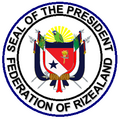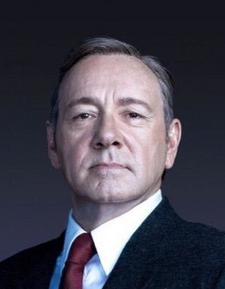President of Rizealand
| President of the Federation of Rizealand | |
|---|---|
 Presidential seal | |
 Presidential flag | |
| Executive branch of Rizealand Executive Staff of the President | |
| Style | Mr. President (informal) The Honorable (formal) His Excellency (diplomatic) |
| Status | Head of state, Head of government |
| Member of | Cabinet Homeland Security Council |
| Residence | Whitehall |
| Seat | Camden |
| Appointer | Direct election Two-round system |
| Term length | Five years, renewable once. |
| Constituting instrument | Articles of Federation |
| Formation | June 6, 1773 |
| First holder | James Camden |
| Salary | $568,000 |
| Website | www.president.gov.rzl |
The President of the Federation of Rizealand (POTFOR) is the head of state and head of government of the Federation of Rizealand. The president directs the executive branch of the federal government and is the commander-in-chief of the Rizealand Armed Forces.
The power of the presidency has grown substantially since its formation, although ebbing and flowing over time. Since the beginning of the 20th century, the presidency has played an increasingly strong role as the nation became industrialized and partisanship weakened the unity of the Central Assembly. However, some of the president's power was reduced by constitutional reforms passed in 1975. Article 4 of the Articles of Federation establishes the executive branch of the federal government and vests most of the executive power in the president. The power includes the execution and enforcement of federal law and the responsibility to appoint federal executive, diplomatic, regulatory, and judicial officers. While this power used to be absolute, 1975 constitutional reforms allowed the president's appointment and removal powers to be restricted in certain situations and allowed the president's execution and enforcement responsibilities to be shared and exercised by other officials and agencies. The president also has the primary responsibility for conducting foreign policy which includes appointing and receiving ambassadors, negotiating treaties, and commanding the Rizealand Armed Forces as commander-in-chief.
The president plays a leading role in federal legislation and domestic policymaking. As part of the separation of powers doctrine, the president has the power to sign or veto legislation passed by the Central Assembly. Because modern presidents are viewed as the leaders of their political parties, policymaking is significantly shaped by the outcomes of presidential elections, with presidents taking an active role in promoting their policy priorities to members of the Central Assembly who are electorally dependent on the president. In recent decades, presidents have also made increasing use of their bully pulpit, executive actions, agency regulations, and judicial appointments to shape domestic policy.
Originally, the president was elected indirectly by an electoral college for a five-year term, along with the deputy president. Following the 1975 constitutional reforms, the president and deputy president are both elected directly by the national popular vote and limited to serving only two terms in office. In addition, five deputy presidents have become presidents by virtue of a president's intra-term death, resignation, or removal from office.
Cal Aderhall is the 32nd and current president of Rizealand, having assumed office on December 1, 2018.
Legislative powers
While Article 3 of the Articles of Federation vests all lawmaking power in the Central Assembly and prevents the president (and all other executive branch officers) from simultaneously being a member of the Central Assembly, the president has the ability to influence the passage and enactment of legislation nonetheless. The president's most significant power in this area is the power to veto any bill passed by the Central Assembly. Under Article 3 of the Articles of Federation, any bills passed by the Central Assembly must be signed by the president to take effect. If the president vetoes a bill, he must send a record of his objections to the house from which it originated and the Central Assembly can override a presidential veto with a three-fourths majority in both houses. If the president signs the bill or does nothing within ten business days of receiving it, it is enacted into law unless its constitutionally is challenged by the Attorney General.
In addition to vetoing or signing bills into law, the president has the constitutional responsibility to provide a "state of the federation" address to a joint session of the Central Assembly on a regular basis. Typically, the president gives this address to a joint session of the Central Assembly in the beginning of the year when the legislative session starts. These addresses offer the president an opportunity to outline his legislative proposals for the coming year and attempt to shape the direction of the Central Assembly. Informally, the president can also draft and suggest legislation for consideration by members of the Central Assembly.
Another legislative power of the president is the president's role in the administrative state. As head of the executive branch, the president has broad control over many executive agencies that issue their own regulations, guidance, and directives that compliment laws passed by the Central Assembly. However, this power is weaker today as many powerful and influential executive agencies are isolated from the president's control. These agencies either have officials appointed by the president but protected from any firing other than for-cause or do not have any officials appointed by the president, with appointing power going to others in the government.
Lastly, the president has the power to call the Central Assembly into session or adjourn them, if they are unable to do so themselves. However, this power has not been frequently exercised as the Central Assembly typically remains in session year-round.
Executive powers
Article 4 of the Articles of Federation explicitly vests executive power in the president who is tasked with ensuring all laws are faithfully executed. To assist the president in faithfully executing all laws, the Central Assembly has established numerous federal departments and agencies under the president's control. The heads of these agencies (most of whom are members of the Cabinet) and ambassadors are appointed by the president, with the advice and consent of the House of Representatives, and serve at his pleasure. Historically, the president's executive appointments had to be approved by a majority of the State Council. The 1975 constitutional reforms however tasked the House of Representatives with that responsibility instead. Although the president originally appointed all executive agency heads and could fire them at will, the 1975 constitutional reforms allowed for the Central Assembly to create executive/administrative agencies that could be led by agency heads 1) who were appointed by someone other than the president and 2) could be granted for-cause protections to prevent from arbitrary firing and provide some independence from the presidency. While some agencies have been created under this new design, many federal executive agencies are still run by agency heads appointed by the president and serving at his pleasure. Given the president's appointment and removal powers, he also has the ability to direct and lead executive agencies through executive directives and proclamations that are binding on executive agencies, except those considered independent of the president.
The president is tasked with receiving ambassadors, which has been interpreted to give him broad powers over foreign policy including the ability to grant recognition to a foreign government, appoint ambassadors and heads of diplomatic missions with the advice and consent of the State Council, and negotiate agreements on the behalf of Rizealand, subject to ratification by a three-fourths majority of the State Council. The president is also the commander-in-chief of the Rizealand Armed Forces. While the power to declare war is vested in the Central Assembly, the president is responsible for the direction and disposition of the military. The president also cannot deploy military force without an authorization for the use of military force from the Central Assembly, except in the case of an emergency, such as direct danger of invasion or attack. In addition to requiring the Central Assembly's approval to go to war or use military force, the president's war powers are also limited by the fact that the Central Assembly controls the military's budget.
The president also has the power to appoint all federal judges. Historically, the president nominated judges and they had to be confirmed by a majority of the State Council. After the 1975 constitutional reforms, the president no longer has the power to independently choose judges for appointment to the federal bench and must instead make his appointments from a list of candidates provided by a Federal Judicial Selection Committee. The president also has the power to grant pardons, reprieves, and commutations of sentences, although the 1975 constitutional reforms added the requirement that the president cannot issue a pardon for himself or any individual related by adoption, blood, or marriage. The president also has the advantage of executive privilege (which prevents him from having to disclose communications in the performance of official duties), national security privilege (blocks the disclosure of documents that could harm national security in court proceedings), and a form a immunity from civil and criminal actions during tenure as president. While one cannot pursue a criminal or civil action against the president during his tenure in office, statutes of limitations are considered tolled during the time he is in office and if the offenses are particularly egregious, the president could be removed from office by the Central Assembly.
Leadership roles
As head of state, the president represents Rizealand's government to its people and the nation to the rest of the world.
